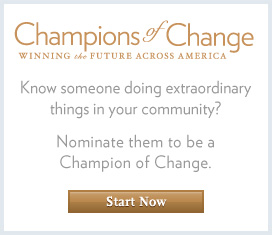Champions of Change Blog
We Can All Be Change Leaders: Employing People with Many Abilities
Posted by on October 20, 2014 at 2:00 PM EST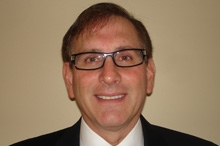
David Bartage is being honored as a Disability Employment Champion of Change.
I am surprised and incredibly honored to be recognized as a White House Champion of Change for Disability Employment. What began as a small project has led to be my passion, encouraging businesses to find good-paying and sustainable employment opportunities for people with disabilities.
In 2010, the Procter & Gamble (P&G) site in Auburn, Maine, began planning to add a customization (FlexiCenter) center into their 24/7 manufacturing operation. During our initial discussions, we discussed how we should staff this center and quickly concluded that we should reapply a staffing model we saw at Walgreen’s Distribution Center, in which 30% to 40% of the employees were people with disabilities.
A local hiring agency for people with disabilities recommended me to reach out to the Maine Bureau of Rehabilitation Services (ME BRS) to develop strategies to integrate individuals with disabilities into our new customized packaging facility, the FlexiCenter. P&G and ME BRS partnered together to identify people with disabilities, the individuals were trained and assessed by ME BRS, and they were then re-assessed in the P&G workplace. ME BRS also worked with our manufacturing site, providing training to all our employees to better prepare us to encourage and support inclusion in the workplace.
Today, more than three years after opening the doors to the FlexiCenter, 40% of the FlexiCenter employees are individuals with disabilities, working alongside workers who have not disclosed any disability, performing the same jobs with the same expectations and same pay. Some of the benefits of the FlexiCenter include: increased productivity, zero safety incidents, zero quality incidents, 90% reduction in turnover, a significant improvement in morale, reduced hiring costs, reduced training costs, and increased “goodwill” in Maine.
As I was getting involved with our FlexiCenter, I worked with the Maine State Chamber of Commerce, the Maine Department of Health and Human Services, and the ME BRS to start up the Maine Business Leadership Network (ME BLN). Since its inception, I have been the business leader of the ME BLN. The ME BLN is a state affiliate of the United States Business Leadership Network (USBLN). The ME BLN offers member employers resources for recruiting candidates with disabilities, information on disability issues, recognition for best disability employment practices, and exposure to an untapped market for their goods and services. We also view our role as that of a catalyst and a "connecting point" to promote dialogue and sharing of best practices between employers in a peer-to-peer setting.
Upon meeting someone for the first time, we are often times asked, “What do you do?” When asked that question, I imagine that for many the first response is what you do for a living. We take a lot of pride in what we do, and it helps to define who we are. It gives us an identity.
Over the last several years, I have seen what employment opportunities have done for our P&G employees with disabilities. It has given them an identity. It has provided them with an opportunity to be integrated into everyday life. It has impacted the employee and the employee’s family. I have heard parents thank us for giving their child an opportunity to work. They have expressed concern that they felt they had to outlive their child to provide them support. They now have hope that their sons and daughters can make it on their own.
What started as a project has turned into a passion for helping others and spreading the word of sustainable employment opportunities for people with disabilities. I encourage you to get started and make a positive change in your own way.
David Bartage is the Plant Finance Manager for the Procter & Gamble, Auburn, ME facility leading the Auburn sites’ efforts in hiring people with disabilities.
Learn more aboutABLE to Work
Posted by on October 20, 2014 at 2:00 PM EST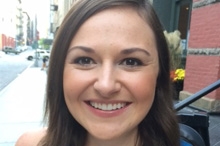
Alexandra McArthur is being honored as a Disability Employment Champion of Change.
I love my job. As an Associate Consultant at the Taproot Foundation, I work with the country’s top companies to help them build high-impact corporate pro bono programs. I enable companies to use their most important resources, their people, to support nonprofits that are strengthening our communities. My position is challenging, fulfilling, and provides me with a livelihood. Seems pretty lucky, right?
As a person with a disability, a member of a population where only one out of three of adults ages 18-64 are employed, I’m more than lucky. Barriers, such as poor inclusion training, inaccessible workplaces, benefit systems that disincentive savings, and lack of financial literacy, are keeping talented persons with disabilities out of the workforce. Thus the poverty rate for people with disabilities is nearly double the U.S. national poverty rate.
This is why I work to reduce these barriers and change these statistics. In 2011, I was chosen as Ms. Wheelchair America on a platform of promoting workplace inclusion. In this position, I traveled across the nation to speak with corporations, associations, diversity groups, government officials, and job-seekers about how every sector can benefit from the talent, perspective, dedication, and creativity that people with disabilities bring to and encourage in their workplaces.
As a Co-Chair of the Junior Board of Resources for Children with Special Needs, I’ve helped to expose over 60 young professionals to the often-overlooked needs of the disability community. The Junior Board meets regularly to advocate for policy changes, volunteer with youth with disabilities, and to raise money for the organization. I’m thrilled that this year we chose disability employment as our advocacy focus. The board members now know how to make their workplaces, which include schools, investment firms, media agencies, just to name a few, more open to hiring people with disabilities and more accommodating to employees with disabilities.
There is much more work to be done to make improvements in the disability employment statistics, which have remained essentially unchanged since the passing of the Americans with Disabilities Act nearly 25 years ago. Workforce development programs must integrate specialized programming for people with disabilities. Employers need training about the positive ways hiring people with disabilities impacts their bottom line, in addition to tangible strategies and avenues for recruiting people with disabilities. The disability community needs specialized financial literacy education.
But perhaps the most significant change needed is currently sitting in the hands of our lawmakers: the ABLE Act. Presently, a person with a disability who receives Social Security benefits cannot have more than $2,000 to their name without losing those benefits. $2,000. Total. The ABLE Act will provide the option for people with disabilities on benefits to earn a living and save for crucial expenses, such as retirement or medical equipment. Thus, it will allow gainful employment to be a realistic option and a true avenue for wealth accrual for people with disabilities.
I envision a world where people with disabilities are seen as assets in the workplace and are represented in the middle class. Through workforce development, financial education, and passing of the ABLE Act, let’s take steps together to make this vision a reality.
Alexandra McArthur is a Senior Associate Consultant at the Taproot Foundation and was Ms. Wheelchair America 2011.
Learn more aboutInclusion Is Imperative in Today’s World
Posted by on October 20, 2014 at 2:00 PM EST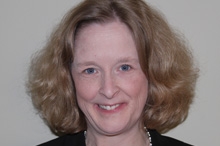
Angela Mackey is being honored as a Disability Employment Champion of Change.
As an individual with a disability, I know all too well the barriers that those in this segment of our society face. Historically, opportunity and disability seldom go hand-in-hand. I grew up with a grandfather who also had a disability, and I learned that others sometimes used his disability as a reason for exclusion from privileges such as education, a meaningful career, and social acceptance. Being around him as a child, I knew the barriers I would also one day face. The conversations growing up between myself and my grandfather were motivational exchanges, in which he listened to me recite my goals for the future and, in response, offered words of encouragement regarding them coming to fruition. I often wonder what my fate might have been without those interactions.
I was fortunate. At an early age, I understood that through my own determination, hard work, and God, I could be more than just a person with a disability. I also knew that with an education, and eventually a career, I would have a voice. Without a job, I knew that it would be extremely difficult for me to feel like I was in control. In my mind, work equated to personal power. Work, in a lot of ways, leveled the playing field. I might not have the ability to run a mile or score a homerun, but I could operate a computer system with the best of them.
This ideology is why I believe inclusion is so imperative in today’s world of work. I often tell those I train that I am just as capable as someone without a disability, but until I am provided an opportunity to show what I can do, nobody believes it. Luckily, I have had two organizations, South Carolina Vocational Rehabilitation and Walgreens, to open their doors to me to show what I can do, and in doing so, I have assisted others in doing the same. Inclusion does not mean that we want an easier job or a different set of standards. We just want a chance to enter the door like anyone else.
Angela Mackey is a Human Resources Generalist at the Walgreens Distribution Center in Pendergrass, Georgia.
Learn more aboutInnovative Opportunities for Entrepreneurship
Posted by on October 20, 2014 at 2:00 PM EST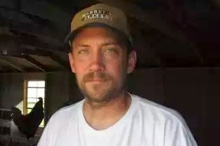
Dan Hromas is being honored as a Disability Employment Champion of Change.
I am the owner and operator of Prairie Pride Poultry, a small pastured chicken operation located on the northeast edge of York, Nebraska. I started the farm in 2013 in order to support the growing local food movement by providing healthy, farm fresh eggs to area consumers.
At the farm, we pride ourselves on the humane treatment of the flock of heritage Rhode Island Red chickens. The farm’s standards and practices are conducive to a happy and healthy flock. Coops are moved around the acreage, each one having plenty of floor area, roosting space, and nesting boxes. The flock’s pasture diet is supplemented with feed that does not contain any chemicals, hormones, antibiotics, or animal byproducts; the feed comes from only 14 miles away from a cooperative that has recently achieved HACCP Certification, the highest level of accreditation for food safety in the United States.
In addition to providing the local community with farm fresh eggs, Prairie Pride Poultry also assists in educating consumers and potential farmers about the “Incredible Edible Egg” by sharing interesting facts and information about the widely used and versatile protein source, as well as fostering an environment whereby everyone can feel welcomed at and connected to the farm. I’ve engaged local communities through the York Chamber of Commerce, establishing a great working relationship with Grand Central Grocery in York and participating in the Center for Rural Affairs’ “Farm to School” initiative by selling eggs to York Public Schools, setting up at local farmer’s markets, and raising awareness about importance of a healthy diet that can include eggs.
Before working on the farm, I served in the U.S. military in Iraq. I have also served as a Captain in the Nebraska Army National Guard as a Transportation Corps Officer. I am fortunate enough to have had my hard work receive national recognition through the Farmer’s Veteran Coalition’s national marketing campaign, “Homegrown by Heroes.” I have utilized services from the Nebraska Sustainable Agriculture Society, Center for Rural Affairs, and the Farmer Veteran Coalition as a platform for outreach to other fellow disabled military veterans so that they know a future exists for them in the field of agriculture.
I am honored to receive this Champions of Change award. I hope that other veterans with disabilities will similarly find their own entrepreneurship opportunities, gaining meaningful employment and contributing to their local communities.
Dan Hromas is the owner and founder of Prairie Pride Poultry, a pasture-raised egg business in York, Nebraska.
Learn more aboutIt’s the Economy!
Posted by on October 20, 2014 at 2:00 PM EST
John Robinson is being honored as a Disability Employment Champion of Change.
Did you know that individuals with disabilities have $2.7 trillion in annual disposable income in the United States? Did you know that the unemployment rate for individuals with disabilities is 12.3%, as compared to 5.5% for able-bodied citizens? Now imagine what the disposable income would be in the United States the unemployment rates of those two groups was the same.
It's the economy! We live in an economy that is built upon growth. Yet, we are seeing the baby boomers leaving the workforce. We see an increased population of individuals with disabilities in aging citizens, soldiers coming back from service injured, and individuals with developmental disabilities. We as a society need to be able to filling positions with individuals with disabilities. If our economy is to grow, this population must be utilized.
Twenty-five years ago, at the beginning of the Americans with Disabilities Act, I had just graduated from Syracuse University with a degree in television, radio, and film management. Many of my peers received job offers around the United States, while I moved back in with my parents and cleaned swimming pools to make ends meet. I had strong grades, had a successful internship in Boston, and was well prepared for an entry-level position. Unfortunately, society was not ready for a quadruple amputee looking for gainful employment in media. It took me four years before I was offered an entry-level position inside a television station.
Twenty-five years later, I am proud to have had a long career inside the television industry. I am equally proud of my advocacy work on behalf of individuals with disabilities. At Our Ability, we are working inside American companies to facilitate employment opportunities for individuals with disabilities. We are using our communications experience to help facilitate internal messaging. We are building disability etiquette training seminars inside companies. We are building an online portal for individuals with disabilities to be able to upload their skill set—Our Ability Connect. As the founder of Our Ability, I am very purposely building the foundation that I and so many others needed 25 years ago.
I know we are on the right path. With the changing regulations for federal contractors and subcontractors, there is now an increased interest from businesses to find out more about including people with disabilities in their workforce. I can see it in the seminars I give to human resource managers, who pick up the pens and take notes especially when I talk about disability etiquette and sensitivity. There is an increased awareness about communicating effectively with people who are deaf and visually impaired. This expanded understanding of how to communicate with coworkers is vital to a successful inclusive organization.
While it seems like an impossible goal to level the unemployment statistics between individuals with disabilities and able-bodied citizens, it is something we all need to work towards. Our global economy is built upon growth, and by including individuals with disabilities in the next 25 years we can increase that $2.7 trillion annual disposable income.
Why are the statistics so important? Employment is only one portion of the total self-worth of the individual, but it is quite possibly the most important. We all identify ourselves by where we work. It's one of the first things we mentioned when we introduced ourselves to someone new. We all understand how inferior we feel when we are unemployed or underemployed. This is especially true with someone with a disability. By opening opportunities for inclusive hiring inside major companies, we are not only affecting our economy but are also building the next generation of confident individuals. We as a society are truly becoming inclusive.
John Robinson is Managing Partner and CEO of Our Ability, a company owned and operated by people with disabilities for people with disabilities.
Learn more aboutCatalyst for Change
Posted by on October 20, 2014 at 2:00 PM EST
Jennifer Rojas is being honored as a Disability Employment Champion of Change.
As with most things, “disability” means different things to different people. It can be empowering and shameful, unifying and divisive. To me, it is a way of life—it is in the air I breathe, the steps I take, and the choices I make each and every day. While I take pride in how far I’ve come, I believe it is important for society to remember that I am not particularly brave or courageous. While I am disabled, I am just like you.
Yet, I also recognize that individuals with disabilities often experience moments in which they are seen as something less than themselves. Maybe they are left out of office activities and daily conversations with co-workers. Maybe they miss out on employment benefits—or employment opportunities. I have found that many people believe that individuals with disabilities have unique sets of experiences. And while this may be true, it gives credence to the notion that individuals with disabilities cannot take full part in society. It reinforces societal myths, fears, and misunderstandings that hinder progress for individuals with disabilities. So, the question is, how do we change this?
I see it as my job to help dismantle these impediments. In 2013, McLane Company introduced the SPARK initiative. The initiative aims to increase awareness and provide meaningful employment opportunities to people with disabilities by implementing inclusion strategies that recognize talent, increase engagement, and drive business results.
As Inclusion Manager for McLane Company, I recognize two ideas that lead to successful disability employment—disability awareness and change leadership. These ideas are inherently co-dependent. Disability awareness draws on the understanding that education is powerful and lends itself to breaking barriers of perception. After all, you don't know what you don't know. At its core, successful change leadership is ultimately about unity. Significant changes towards policy and inclusion are formed not only by instituting large-scale programmatic change but also by encouraging the individual understanding of both the problem and the solution. I believe change leadership is not something that can be pushed on to people; it must start small and be given room to cultivate.
I came to McLane with over 10 years of experience in the public workforce system and disability employment. I knew that the programs and systems in place were good, that they were valuable, and that they could produce favorable results. I also knew that the individuals coming out of these programs could be successful only with industry at the table. However, this kind of innovation must extend beyond individual companies and be felt across the nation. With the passing of the Workforce Innovation and Opportunity Act of 2014, the country is creating better avenues for preparing job seekers with disabilities to compete. This is the kind of change that we must all work for to continue to create a new era of disability employment.
Jennifer Rojas is the Inclusion Manager for McLane Company, Inc.
Learn more about
- &lsaquo previous
- …
- 12
- 13
- 14
- 15
- 16
- 17
- 18
- 19
- 20
- …
- next &rsaquo

